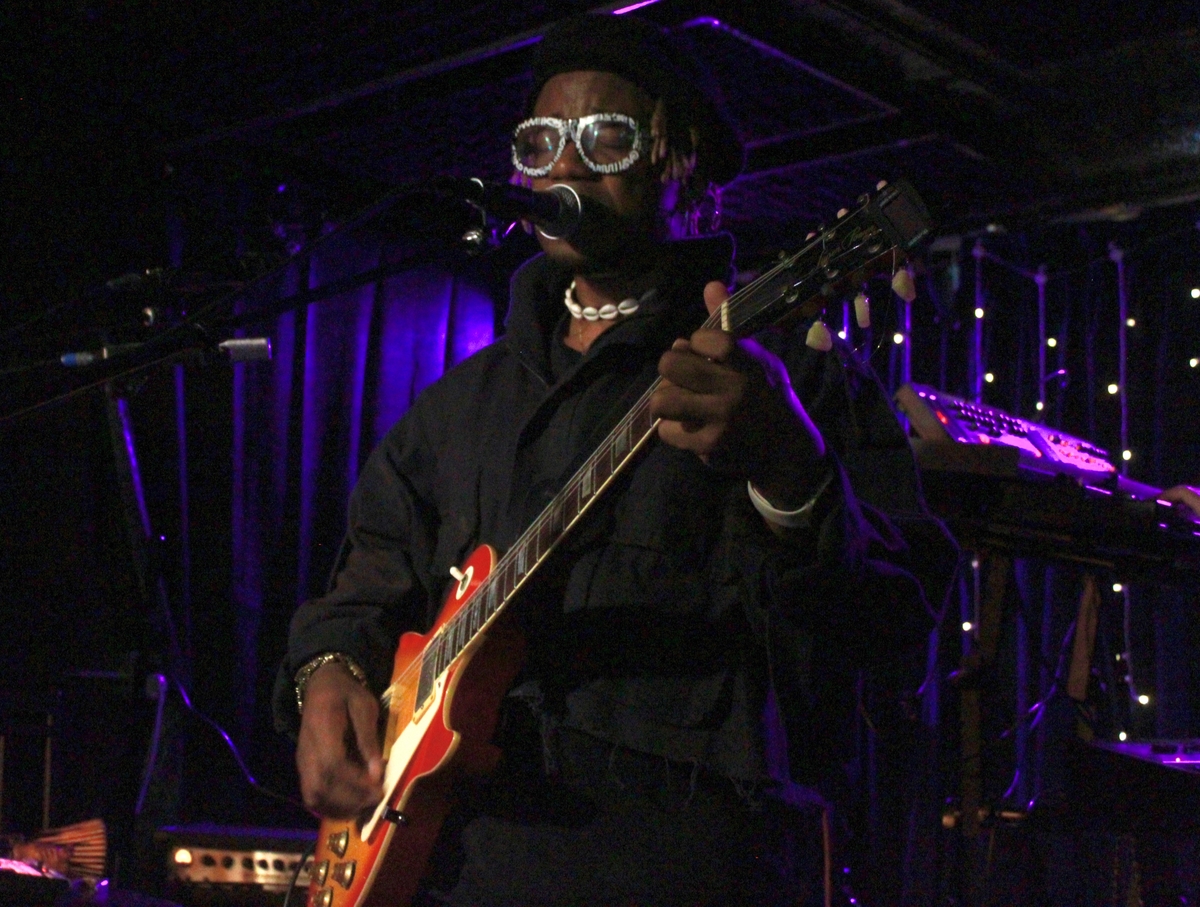
Brian Slattery Photo
Blick Bassy.
A triple bill at Cafe Nine on Saturday Night headlined by Cameroonian touring artist Blick Bassy featured two younger New Haven acts who tipped their hats to those older than they were, even as they showed everyone in the room that the future of music in the Elm City is in safe hands.
Ammar — flanked by Tim and Izzy on guitars — began his set by referencing the unrest in the world, from Gaza to across the northern half of Africa. As a Sudanese-American, he said, “it’s been affecting my personal life.” He currently has relatives living with him as refugees, and he dedicated the first song, “Elephant in the Room,” to them.
After his first song, he remarked on the empty space in front of the stage. “I would love it if that space could be filled,” he said, even though “I know a lot of you are older than me.”
“Why don’t you play something we can dance to?” someone called from the audience, good-naturedly. Ammar laughed. He explained that they usually played with a drummer (this reporter can corroborate this), but this Saturday they were trying something new — a new sound, a new instrument for Ammar in playing the bass, new material to perform. Without a drummer, the songs had a big, spacious sound, giving the audience a chance to appreciate the Middle Eastern and North African-inflected harmonic structures Ammar employed, and more of the twists and turns in his melodies, casting a spell. Even without a drummer, the audience came closer.
After his third song, Ammar debated whether they should release it.
“Old guy says yes!” someone yelled from the audience.
Ammar laughed again. “What’s your name?”
“Drew!” said Drew.
“Shout out to Drew!” The audience cheered. That they were paying attention was never in doubt; conversation stilled for every moment of Ammar’s music, and broke into immediate applause afterward. Ammar announced he had one more (“do three more!” Drew yelled) that he wrote two days ago, so he might “fuck it up.” He then apologized to the older folks in the room for his language, and was met with a barrage of joking obscenity from the crowd. The tone — familiar, casual — was set for the rest of the evening.
Nehway grabbed the audience’s attention immediately, and held it for the duration of her set, with her atmospheric guitar playing and haunting, floating voice that seemed to hold listeners in a trance. During the pandemic shutdown, she said, “I started doing music for real,” and “so did everyone else.” She understood. “We were all just trying to show that we were here,” she said.
The bar stayed silent through song after song, listening to every note and every word. In the middle of her set, Nehway explained that she’d “dreaded” the set — in a positive way, but dreading it nonetheless, as she felt nervous about how it would go.
“But you’re so good!” Drew yelled.
“Do your shit, girl!” someone else yelled.
Through a rapturous cover of the Janis Ian song “Stars,” she outlined a direct connection to the past, explaining that Nina Simone had covered the song, and then it appeared on the cartoon Bojack Horseman, which made the titular character think “this is me.” Nehway watched that episode and thought, “this is us.”
She finished her set singing along to a lush backing track she made, in what was perhaps the most beautiful song thus far. But first she shouted out her father, who was in the audience. The song, she said, was written out of a sense of outrage. “I thought my parents didn’t understand me, but it turned out I didn’t understand myself,” she said. “Sometimes your parents know.”
The night concluded with a stunning set of music from Blick Bassy. Born in Cameroon and now living in France, the 50-year-old Bassy has been a musician all his life; he toured Cameroon as a younger man and now tours internationally, as far as New Zealand, playing clubs and festivals. In short, it’s very likely the next time we have a chance to see Bassy, it will have to be in a much larger venue.
Bassy and his backup band — two musicians, one of whom played programmable drum pads and touch pads and the other who played keyboards and trumpet — deployed a vast array of electronics and effects to create a huge sound. The programmable pads were used to make slippery bass parts. The trumpet was run through effects to allow it to sound like a horn section. Bassy himself sang through one of three possible microphones, two of which were run through processors to create harmonies for his voice. The marriage of organic and electronic sounds was seamless and endlessly inventive, and all anchored by Bassy’s voice: strong, raspy, somehow declarative and plaintive at the same time, always suffused with great depth of feeling. He sang in his native tongue of Bassa, but communicated his message loud and clear.
He did stop to explain that many of his songs were about Cameroon, which had been brutally colonized and then brutally run after its colonial period ended. He wondered aloud if there was ever a chance to find a way to live to emphasize how “we are all connected — I am because you are,” he said. “We are all just water. How can we create a new world where we are all connected?”
It was a far-off dream, Bassy knew. But his music — connected to a deep cultural past, yet deploying advanced music technology to make futuristic sounds — felt like a first step toward exploring the possibilities.